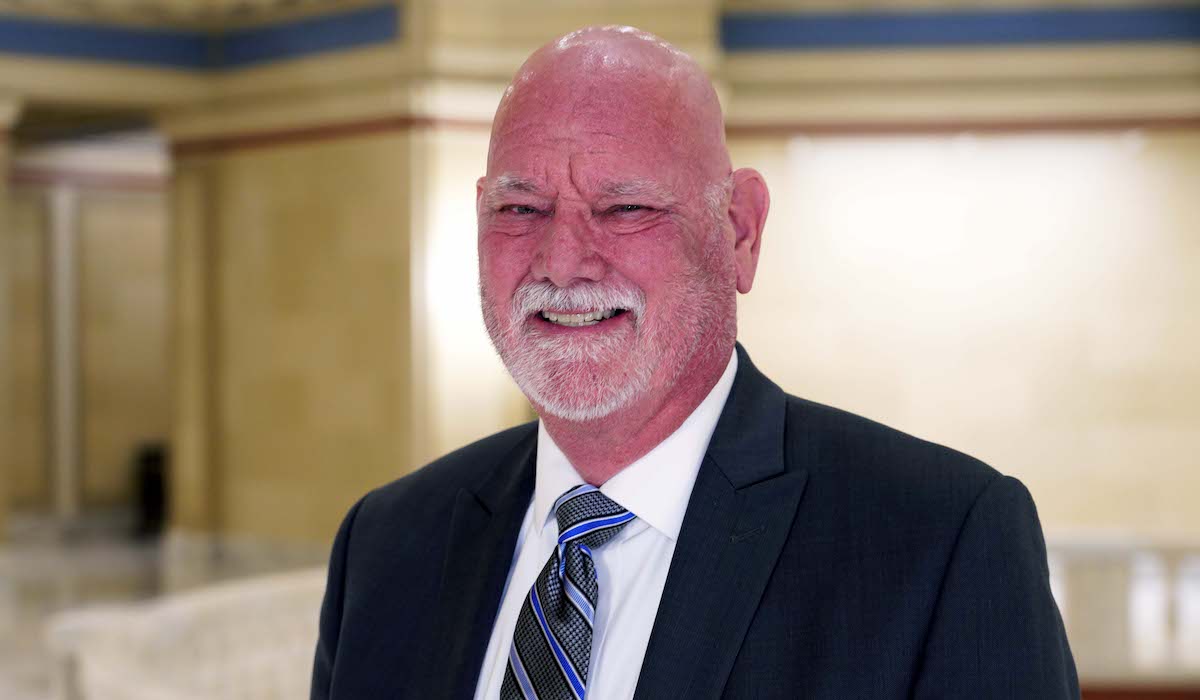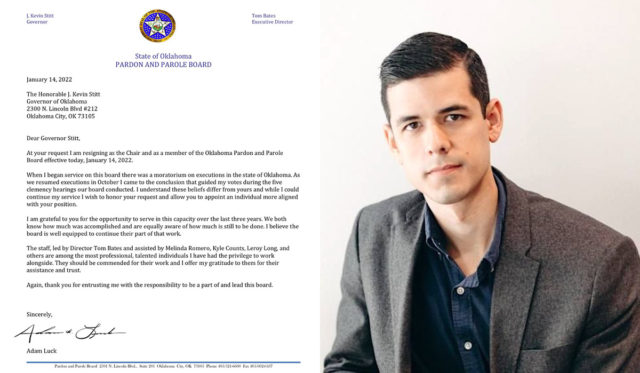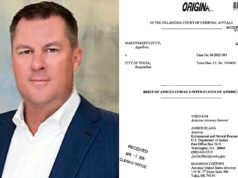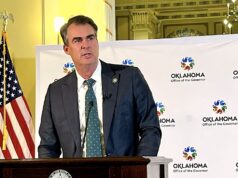
Noting that his beliefs on the death penalty are different than Gov. Kevin Stitt’s, Adam Luck said he resigned today from the Oklahoma Pardon and Parole Board at the governor’s request.
“When I began service on this board there was a moratorium on executions in the state of Oklahoma,” Luck wrote in his resignation letter. “As we resumed executions in October I came to the conclusion that guided my votes during the five clemency hearings our board conducted. I understand these beliefs differ from yours and while I could continue my service I wish to honor your request and allow you to appoint an individual more aligned with your position.”
Stitt immediately announced the appointment of retired police officer and Episcopal bishop Edward Konieczny as a replacement to the board, which considers prisoner requests for sentence commutation and has been under criminal investigation since March 2021 regarding the decisions to release certain incarcerated persons.
“I am excited to welcome Edward to state service as a member of the Pardon and Parole Board,” Stitt said. “He is an inspiring leader with a servant’s heart, and I am confident in his ability to make and own responsibility for critical decisions.”
But whether Konieczny’s position on the death penalty — a criminal justice policy for which Stitt emphasizes his support — aligns with the governor’s is unclear. In 2021, Konieczny signed onto an Oklahoma Conference of Churches letter opposing the death penalty.
“While God knows what is in people’s hearts and actions, we humans are not privy to all such knowledge,” the letter signed by 18 clergy members read. “We recognize the need for a system of justice to provide for order in protection of society, but we also believe that we should not usurp the authority of God in rendering final and absolute judgment.”
According to Dillon Richards of KOCO, the Stitt administration said Konieczny did not mean for his name to be on the letter and missed a 48-hour window to have it removed. In Stitt’s press release, the bishop said he will serve on the Pardon and Parole Board “impartially.”
“It is an honor to be selected to serve on the state Pardon and Parole Board,” Konieczny said. “With nearly 20 years in law enforcement and 28 years in ministry I believe I bring a unique, equitable, and relevant perspective to this position. I am committed to fulfilling my duty and responsibility impartially and in accordance with the law of Oklahoma.”
Konieczny served as bishop, CEO and president of the Episcopal Diocese of Oklahoma from 2007 through January 2021. From 1975 through 1992, he worked as a police officer in California.
The Episcopal Church as a whole has called for the end of executions in America, but a Stitt spokesperson said Friday that Konieczny told the governor that he is open to voting to uphold a death sentence.
“[Edward] Konieczny has assured the governor he is prepared, should he believe it to be appropriate, to vote in support of the death penalty in accordance with the law of Oklahoma,” said Carly Atchison, communications director for Stitt.

Background on Pardon and Parole Board investigation
Stitt appointed Luck, Kelly Doyle and Robert Gilliland to the Pardon and Parole Board in late February 2019. Gilliland resigned in January 2021, about six weeks before he died. Luck and Doyle have been criticized by prosecutors — chiefly Oklahoma County District Attorney David Prater — for their professional connections to organizations that assist people leaving prison.
Stitt requested a criminal investigation into processes of the Pardon and Parole Board in early 2021 after questions were raised about why a man named Lawrence Anderson — who confessed to a grizzly triple-murder — had been recommended for release.
In January 2020, the Pardon and Parole Board voted 3-1 to recommend the early release of Anderson, who had received a 20-year prison sentence in 2017 for drug crimes. Anderson had been denied commutation in July 2019. He was re-docketed in October 2019, and his Stage 2 hearing was held in January 2020, with the board recommending a commutation to the governor. Stitt approved the recommendation in June 2020, commuting Anderson’s sentence to nine years. Anderson was released Jan. 16, 2021, after serving three years in prison and committed the murders less than a month later.
From September through December, a dark-money organization called Conservative Voice of America ran advertisements on Facebook and Fox News criticizing Stitt as being “soft on crime” and “hell bent” on making Oklahoma a top-10 state for violent crime. Some of the ads referenced Anderson, and one on Facebook showed a photo of Luck while criticizing him for voting to recommend the commutation of Julius Jones’ death sentence.
The investigation into how Anderson was re-docketed was originally conducted by the Oklahoma State Bureau of Investigation and a special prosecutor, Brian Kuester, appointed by then-Attorney General Mike Hunter. Kuester concluded his involvement in the investigation in December, although Prater is still reviewing the matter and is expected to present evidence to his Oklahoma County grand jury this spring.
Prater declined to comment on Luck’s resignation Friday. A phone call to Luck was not returned prior to the publication of this article.
(Update: This article was updated at 9:50 p.m. Friday, Jan. 14, to include comment from Atchison.)





















